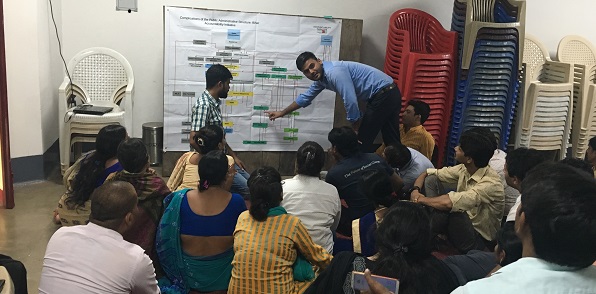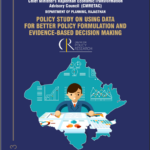
A Practical Approach on Teaching about Governance
8 August 2019
In recent months, the Learning and Development (L and D) team at the Accountability Initiative got the opportunity to run two editions of our flagship programme – Hum aur Humaari Sarkaar – for grassroots development professionals. To conduct back-to-back sessions with such diverse audiences was a first for the team. Among our challenges was how we would deliver the course to two extremely varied groups of people, sectorally and geographically, making sure that both take home valuable and relevant insights from their participation?
The L and D team at AI believes that participants learn best when classroom teaching and discussion ties in with their field insights. With this in mind, the first of the two editions kicked off in Delhi on 19th June with state teams from the Pratham Education Foundation. Pratham works extensively across the country to improve learning levels of children, and we wanted to make sure that the course was interactive from the get-go, with content that was especially relevant to the education sector. Thus, we made sure to focus on aspects such as the complex public administration structure that inhibits effective service delivery of quality education to a child; how and why money to schools gets delayed, and how this impacts teaching and learning.
We tapped into reports and studies from AI’s rich experience of working in the education sphere. Conducting the course focused on administration of education, with an audience well-versed with the everyday ground realities of the topic, meant they could grasp and use insights from our education work. This work has included time-use studies on the education bureaucracy, PAISA surveys (our flagship methodology) which tracks education expenditure across states, and analysis from our annual Budget Brief series. Thus, we could provide useful and hard-hitting evidence for them to engage with the bureaucracy in a more effective and systematic way.
The AI team’s attempt was also to enable the participants to reflect critically on their experiences from the lens of the sarkaar, and be able to nuance how the government provides public services such as education. The idea was to enable the juxtaposition of the three modules of the course with their own experiences, namely:
- ‘Who is the government?’
- ‘How does the government function?’
- ‘What is the role between citizens and government’
This helped our audience to better understand where the bottlenecks lie, and how citizens and governments could work together to overcome them.
As a result, the participants went ahead and held sessions with their peers in states, making the knowledge our course imparted, valuable to many more grassroots staff who interact with the education bureaucracy regularly.
The second edition of the course (held in Patna, Bihar) was different. Unlike the previous edition, where participants were all homogeneous in terms of the kind of work they did (which was education), this was an ‘open’ course with attendees having submitted candidature from diverse sectors such as health, education and livelihoods from across the state. Our effort shifted from focusing on a sector (education) to more on examples from the state of Bihar itself. To prepare for this, the team spent time interacting with our Bihar field research team who are seasoned experts on what goes on in the state, both in government offices and also the diverse kinds of work being undertaken by NGOs. This enabled us to bring in concrete, real life, and engaging examples from the participants’ own milieu during the sessions.
The Patna course was held with our largest batch size until now, and here too, we focused on facilitating our sessions in a way that encouraged maximum peer learning, interspersing lessons with discussions, activities and group work.
But our efforts did not end with the completion of the course edition.
A vital part of our teaching process is the sincerely followed practice of a debrief conversation at the end of every day of the sessions. This is the time when thoughts are shared by team members on how the day progressed, what worked and what didn’t. It is here that snippets of fascinating conversations with the participants, held during tea or lunch break, are also shared. We noticed that course lessons can bring out a gamut of emotions from participants, ranging from cheery optimism to sometimes a more measured assessment. This is in itself a great starting point for us to assess how the course is moving people to act.
We will be coming out with more course editions in the near future with the hope that the constantly evolving and intuitive nature of our programme will help us reach diverse groups of grassroots leaders, and play a meaningful part in their journey towards responsive governance.
Aamna is a Learning and Development Associate at Accountability Initiative.





